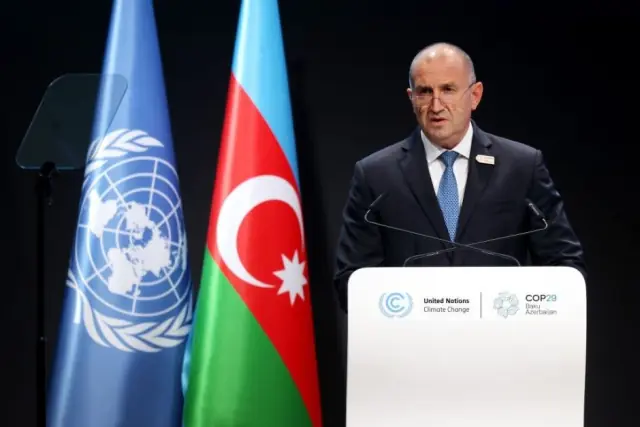
Bulgarian President Rumen Radev announced that he would begin political consultations with parliamentary groups in the newly formed 51st National Assembly only after the election of a Speaker of Parliament.
Speaking to BNR, Radev emphasized the constitutional requirement that the Speaker’s election and the formal establishment of parliamentary groups are prerequisites for consultations with political leaders to officially commence.
“According to the Constitution, the formation of parliamentary groups and the election of the Speaker of Parliament are the essential first steps. Only then can I start consultations with each political group,” Radev clarified.
This procedural update comes as the President participates in the 29th session of the Conference of the Parties to the United Nations Framework Convention on Climate Change (COP29), currently underway in Baku, Azerbaijan.
While addressing Bulgaria’s domestic political affairs, Radev also underscored the importance of the international platform for advancing Bulgaria’s energy agenda.
The event provides an opportunity for Radev to reinforce Bulgaria’s energy collaboration with Azerbaijan, a key partner in renewable energy projects.
Pushing for Green Energy Cooperation
Highlighting Bulgaria’s expanding role in green energy, Radev shared that the country could soon engage in a project designed to transfer renewable energy produced in Azerbaijan.
This initiative would bolster Bulgaria’s renewable energy portfolio by adding green energy from Azerbaijani sources. The project, he noted, aligns with Bulgaria’s strategic goals in energy diversification and sustainability.
“These collaborations open doors for Bulgaria to harness clean energy produced in Azerbaijan, providing a sustainable and secure energy future,” Radev remarked, underscoring the long-term benefits of the proposed energy transfers.
Advancing Energy Security with Greece and Azerbaijan
Radev highlighted Bulgaria’s ongoing energy initiatives, including the vertical gas corridor with Greece, as part of a comprehensive approach to energy security and diversification.
The corridor, he explained, is crucial in lowering energy costs and ensuring a steady supply of energy sources, especially as Europe faces heightened energy concerns amid geopolitical tensions.
Radev’s discussions with Azerbaijani President Ilham Aliyev also covered the potential for this vertical corridor to support hydrogen transmission in the future, an addition that would expand Bulgaria’s involvement in the green energy market.
Hydrogen, considered a cleaner alternative to conventional fuels, could become a vital part of Bulgaria’s energy landscape through its integration with the existing infrastructure.
Bulgaria’s Strategic Position in the Green Transition
Bulgaria’s positioning as a transit point for renewable energy transfer reflects a regional shift toward greener energy solutions. As more countries in Eastern Europe seek to diversify energy sources and reduce dependence on fossil fuels, partnerships like the one with Azerbaijan are expected to play a significant role in meeting climate goals.
The renewable energy transfer project would not only strengthen Bulgaria’s energy security but also contribute to a lower-carbon footprint in the region.
The discussions between Radev and Aliyev suggest a mutual interest in fostering a green energy corridor across borders. Azerbaijan’s commitment to renewable energy production aligns with Bulgaria’s aspirations for energy independence and environmental stewardship.
Next Steps for Political Consultations
With the focus now shifting back to Bulgaria’s internal political landscape, President Radev awaits the election of a Speaker in the 51st National Assembly to fulfill his constitutional role in facilitating consultations with parliamentary groups.
This step is essential for building consensus in Parliament and moving forward with the legislative agenda. However, Radev’s proactive engagement in energy partnerships during the COP29 conference highlights his commitment to positioning Bulgaria as a leader in renewable energy, even as he addresses domestic political obligations.
Radev’s dual focus on securing political stability at home and advancing energy security abroad underscores Bulgaria’s evolving role in regional energy dynamics and climate change efforts.
